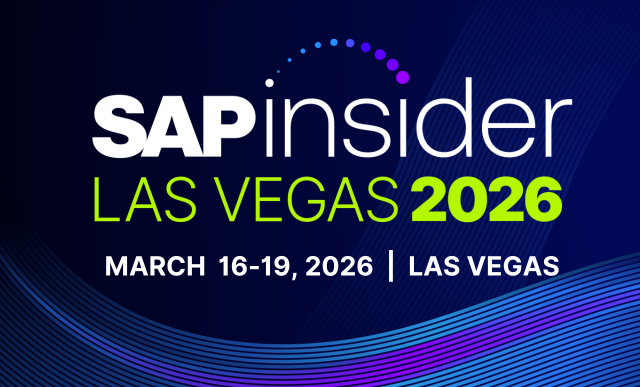SAP Risk Management
Filter By
Browse By
- SAP Analytics and AI
- SAP Application Development and Integration
- All SAP Application Development and Integration
- SAP ABAP
- SAP ABAP Development Tools
- SAP ABAP Test Cockpit
- SAP API Management
- SAP BAPI
- SAP Basis
- SAP BRF
- SAP Business Application Studio
- SAP CMS
- SAP Design Studio
- SAP Development Tools
- SAP DevOps
- SAP EAI
- SAP EDI
- SAP Extension Suite
- SAP Fiori
- SAP Fiori Elements
- SAP Integration Suite
- SAP Low Code Application Development
- SAP Low Code Automation
- SAP Netweaver
- SAP Release Management
- SAP UI5
- SAP Web Application Server
- SAP Web IDE
- SAP Business Process Management
- SAP Center of Excellence
- SAP CIO
- SAP Customer Experience
- SAP Data and Data Management
- All SAP Data and Data Management
- SAP BW
- SAP BW/4HANA
- SAP Crystal Reports
- SAP Data Archiving
- SAP Data Center
- SAP Data Governance
- SAP Data Integration
- SAP Data Migration
- SAP Data Quality
- SAP Data Services
- SAP Data Strategy
- SAP Data Visualization
- SAP Data Warehouse Cloud
- SAP DMS
- SAP Document Control
- SAP EIM
- SAP ETL
- SAP ETL Tools
- SAP HANA
- SAP HANA Administration
- SAP HANA Deployment Infrastructure
- SAP HANA Studio
- SAP Master Data
- SAP Master Data Governance
- SAP MDM
- SAP Enterprise Architect
- SAP Enterprise Asset Management
- SAP ERP
- SAP Finance
- All SAP Finance
- SAP Accounting
- SAP AR AP
- SAP Asset Accounting
- SAP Billing Systems
- SAP BPC
- SAP BRIM
- SAP Cash Management
- SAP Central Finance
- SAP Controlling
- SAP COPA
- SAP Cost Center Accounting
- SAP Currency Risk
- SAP e-invoicing
- SAP FICO
- SAP Finance Automation
- SAP Advanced Financial Closing
- SAP Financial Consolidation
- SAP Financial Planning
- SAP FX Risk
- SAP General Ledger
- SAP Global Tax Management
- SAP Hyperion
- SAP Order to Cash
- SAP Payment Processing
- SAP Profitability Analysis
- SAP Rebate Management
- SAP S/4HANA Finance
- SAP SWIFT Compliance
- SAP Treasury Management
- SAP Universal Journal
- SAP Governance Risk and Compliance
- SAP Human Capital Management
- SAP Intelligent Technologies
- SAP Platform and Technology
- All SAP Platform and Technology
- SAP Business Technology Platform
- SAP Cloud
- SAP Cloud Connector
- SAP Cloud Integration Platform
- SAP Cloud Migration
- SAP Cloud Platform
- SAP Cloud Providers
- SAP Cloud Strategy
- SAP Digital Signature
- SAP Container Platform
- SAP HANA Enterprise Cloud
- SAP Digital Asset Management
- SAP Smart Forms
- SAP HEC
- SAP Digital Integration Hub
- SAP Hyperscalers
- SAP Infrastructure
- SAP Messaging
- SAP Quality and Testing
- SAP Security
- SAP Spend Management
- SAP Supply Chain Management
- All SAP Supply Chain Management
- SAP APO
- SAP Asset Management
- SAP Business Network
- SAP Digital Manufacturing Cloud
- SAP Digital Twin
- SAP EWM
- SAP IBP
- SAP Inventory Management
- SAP Label Printing
- SAP Logistics
- SAP Manufacturing
- SAP Manufacturing Automation
- SAP MES
- SAP MII
- SAP MM
- SAP MRO
- SAP MRP
- SAP Order Management
- SAP Plant Maintenance
- SAP PLM
- SAP Production Planning
- SAP S&OP
- SAP SD
- SAP SPM
- SAP Supply Chain Planning
- SAP Track and Trace
- SAP Transportation Management
- SAP System Administration
What is SAP Risk Management?
Risk management for a business isn’t just about identifying and eliminating areas of risk. For many organizations, it’s also about making decisions on acceptable levels of risk and establishing hierarchies of risk — what needs to be immediately dealt with and what can wait. Keeping track of all organizational risk in a centralized way makes it easier for companies to analyze risk impacts — this type of centralization is often enabled by technology. SAP Risk Management is one risk management tool within the SAP Governance, Risk, and Compliance (GRC) suite that supports risk identification, assessment, analysis, and monitoring.
What is SAP Risk Management?
Risk management for a business isn’t just about identifying and eliminating areas of risk. For many organizations, it’s also about making decisions on acceptable levels of risk and establishing hierarchies of risk — what needs to be immediately dealt with and what can wait. Keeping track of all organizational risk in a centralized way makes it easier for companies to analyze risk impacts — this type of centralization is often enabled by technology. SAP Risk Management is one risk management tool within the SAP Governance, Risk, and Compliance (GRC) suite that supports risk identification, assessment, analysis, and monitoring.
Risk management tools like SAP Risk Management often provide better visibility into organizational risk and bring together various types of risk into a single place for monitoring. Risk management solutions may include the following features, among others:
- Risk strategy and planning
- Risk identification
- Risk analysis
- Risk monitoring
- Dashboards and graphical views
- Real-time and automated risk monitoring
- Guided workflows to enforce governance rules
There are many sources of risk in an organization, and some vendors provide solutions to address various risk elements. For example, Appsian Security offers tools that bolster risk monitoring around financial transactions. Fastpath offers risk management solutions that focus on multiple areas of risk, including segregation of duties, regulatory compliance, and access risk. RSM’s toolset provides process automation around risk management.
Key Considerations for SAPinsiders:
- Risk events are rising, compounding the need for better risk monitoring and anticipation. Legacy tools and business models don’t typically offer the capabilities needed to properly manage risk in a centralized place. To fix this, companies are now including risk management as part of their digital transformation activities, implementing intelligent technologies and robotic process automation to help improve risk management and other GRC functions.
- GRC teams are stretched, according to our latest research on the state of the GRC market. The most successful organizations are taking pressure off GRC professionals with automation. You should look to automate risk management wherever possible — it’s best for repeatable processes. Risk management tools that automate risk monitoring and reporting reduce manual labor for GRC staff and free them up to do more strategy and planning.
- You can improve risk strategy and decision making across the entire company, from operations through audit, with risk-aware, risk-adjusted management. You should work toward this goal with strategies such as risk training for line-of-business users and by creating an interdisciplinary risk management committee.
17 results
-

Mitigating Risks by Moving on from Manual Controls Monitoring
Reading time: 1 mins
SAP users are aware of how important it is to develop a thorough risk management policy, especially in the age of constant digital transformation and modernization. As the IT environment grows more complex, workloads and applications move to the cloud and employees work remotely, there is a growing issue of control oversight. With the required…
-
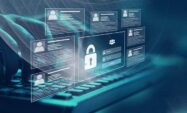
Deloitte Provides Security Guidance for Quantum Computing
Reading time: 2 mins
As the technological capabilities that organizations have access to expand, so do the potential cybersecurity threats within those new opportunities. One area of particular concern is quantum computing. As its capabilities have advanced, experts now see potential for systemic cybersecurity risk. To help companies stem the tide of new risks, Deloitte has partnered with the…
-

- SAP Risk Management
 Premium
Premium
Thoughts on Event-Driven Business Processes, Risk Mitigation, and Running a Real-Time Business
Reading time: 3 mins
Event-driven business processes are becoming more relevant, and there is a great wave of interest in this topic in the SAP ecosystem. The event-enabled nature of the SAP S/4HANA ERP system, coupled with its sibling Business Technology Platform, enables enterprises to use and develop responsive applications rapidly to seamlessly to take advantage of this new…
-
-

Third-Party Risk Is Major Concern for Organizations
Data breaches often result from attackers gaining access to poorly secured third parties as a path to breach their primary target. Unfortunately, many companies have little visibility into or control over third parties that connect to their systems. To counter these risks, organizations should implement a third-party risk management program, advises Parham Eftekhari, senior vice…
-
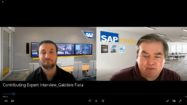
Expert Q&A: The Importance of Integrating Cybersecurity and Enterprise Risk Management
As security professionals are all too aware, cyber threats have become dramatically more visible to many organizations in the last couple of years. And risks have proliferated across the enterprise. Gabriele Fiata, head of enterprise risk management and innovation at SAP, recently sat down with SAPinsider to share his thoughts on the common mistakes that…
-

- SAP Risk Management
 Premium
Premium
Least Privilege 2.0: Controlling Risk in a Dynamic Environment
A growing landscape of laptops and smartphones, widespread internet access, and remote workforces throughout the world have increased the need for risk and identity management and has changed how security models should operate. Continuing to focus on only two dimensions, the “Who” (users and user groups) and the “What” (roles and authorizations), leaves organizations vulnerable…
-

- SAP Risk Management
 Premium
Premium
Beyond SOX: Addressing non-financial risks through SAP configuration and sound supporting processes
While many organizations focus on compliance during an SAP implementation, often related to financial reporting and regulations such as Sarbanes-Oxley (SOX), they might be underutilizing optional SAP controls that could provide extreme value to their SAP system and supporting processes. How can you apply SAP configuration and sound supporting to minimize and mitigate operational and…
-
-
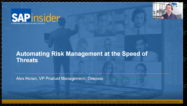
- SAP Risk Management
 Premium
Premium
Automating risk management at the speed of threats
With an increase in malicious cyber activity, organizations are racing to secure their mission-critical applications powered by SAP. An increase in exploitable vulnerabilities means your essential applications, the data running through them, and your operations as a whole are at risk. In this session, we will highlight the current risks organizations are facing and share…
-
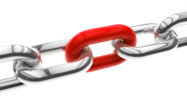
Increasing Threats Highlight the Need for Robust Enterprise Risk Management
Reading time: 2 mins
In the face of challenging micro and macro events, companies need to be able to anticipate and better manage risks that impact their core business objectives. Additionally, legacy business models and IT landscapes don’t contain all of the capabilities necessary to manage risk across the entire enterprise. For example, intelligent technologies like robotic process automation…
-

How to Manage Enterprise Risk in Remote and Digital Environments
Reading time: 12 mins
As organizations migrate to SAP S/4HANA as part of their digital transformation effort, they should prioritize governance, risk, and compliance (GRC). The Institute of Internal Auditors (IIA) has developed a Three Lines Model to help with that journey. First-line roles include operation and support functions; second-line roles encompass corporate risk, compliance, and quality assurance functions;…
Featured Insiders
-

Craig L. Brown, Sr.
Chief Transformation Architect, Xceleon, LLC
-

James Roeske
CEO, Customer Advisory Group
-

Aric Quinones
Managing Director, Protiviti
Become a Member
Unlimited access to thousands of resources for SAP-specific expertise that can only be found here.
Become a Partner
Access exclusive SAP insights, expert marketing strategies, and high-value services including research reports, webinars, and buyers' guides, all designed to boost your campaign ROI by up to 50% within the SAP ecosystem.
Upcoming Events
Related Vendors
Your request has been successfully sent
